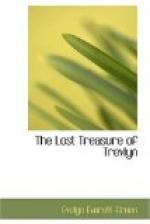“Call me not good lord, call me Rupert, as I have bidden thee before!” was the quick response, as a flush dyed for the moment the smooth fair cheek of the Viscount. “Cuthbert, since we are to travel together, I must needs tell thee my secret. I am not bound for Trevlyn Chase. My father has forbidden me for the nonce to visit there, not for any ill will he bears our kinsfolk, but—but that—”
“But that he fears the bright eyes of Mistress Kate, and hopes by keeping you apart to help thee to forget? Is it not so, Rupert?”
“Marry, thou hast well guessed. Or has it been no guess? Hast thou heard aught?”
“My cousin Kate herself told me somewhat of it,” answered Cuthbert; “but she laughed to scorn the artifice. She is not made of the stuff that forgets.”
“Heaven’s blessing be upon her for a true-hearted maiden!” cried Culverhouse, with a lover’s easily-stirred enthusiasm. “Cuthbert, since thou knowest so much, thou shalt know more. I have made shift to write to Kate about this purpose of mine to visit the forest glades on blithe May Day; and she has sent me a little missive, fresh and sweet and dainty like herself, to tell me that she will ride forth herself into the forest that day, and giving the slip to her sisters or servants, or any who may accompany her, will meet me without fail in a certain dell that doubtless I shall find from the directions she gives. There is a giant yew tree in the midst that would hide six men in its hollow trunk, and a laughing streamlet circles well-nigh round it. She tells me it has got the name of Oberon’s Horseshoe.”
“I know the place well,” answered Cuthbert. “I can guide thee thither. So Mistress Kate will meet thee there! It is like her. She has a daring spirit. I would I could help her to her dowry.”
“Her dowry! thou!” echoed Culverhouse in surprise; and then as they walked onwards through the dewy night, Cuthbert could not but tell a little of his purpose to the comrade who had intrusted him with his own secret; and Culverhouse listened with the greatest interest, albeit without quite the same sanguine hope of success that Cuthbert himself entertained. Still, he was of opinion that a patient search and inquiry instituted by an obscure lad like Cuthbert, used to rough ways and the life of the forest, would be more likely to succeed than one set on foot by any person better known. If the old tradition were true that the gipsies had hidden the gold again in spite, it was possible that after this lapse of time the old hatred would have died out, and that somebody might be willing to betray the precious secret for a sufficient reward. At any rate Cuthbert’s idea of living in the forest and cultivating and studying these strange folk was amply worth a trial. If his quest succeeded, the whole Trevlyn family would be once more wealthy and prosperous; if not, no harm would have been done, and the youth would have enjoyed his free life and new experiences after the winter spent in the confinement of the great city.




